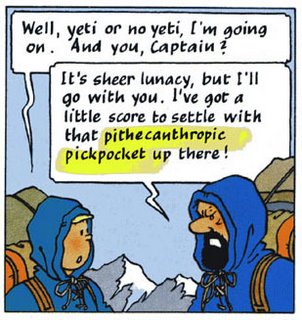Chloé and I are in the middle of a work session:
C "Listen to this: in my thesis I cited Foucault, and then I said 'yet, blah blah blah'. Can you believe I dared say yet about Foucault?"
D "You yetted Foucault?!"
C "I did. I yetted Foucault."
Lo and behold, the verbalized version of conjunction "yet" was born.
C "what's more, I used Thomas Wharton to yet Foucault and he doesn't even know it."
D "wait until he reads it from my blog. Now that I think of it, in my own thesis I yetted Sherrill Grace and the whole postcolonial theory."
C "well, that's something, too."
C "Listen to this: in my thesis I cited Foucault, and then I said 'yet, blah blah blah'. Can you believe I dared say yet about Foucault?"
D "You yetted Foucault?!"
C "I did. I yetted Foucault."
Lo and behold, the verbalized version of conjunction "yet" was born.
C "what's more, I used Thomas Wharton to yet Foucault and he doesn't even know it."
D "wait until he reads it from my blog. Now that I think of it, in my own thesis I yetted Sherrill Grace and the whole postcolonial theory."
C "well, that's something, too."



4 comments:
Curiosity compels me: How does Thomas Wharton yet Foucault?
Chloé cited Foucault as he says that "the world does not provide us with a legible face, leaving us merely to decipher it; it does not work hand in glove with what we already know." (which actually sounds much more beautiful in French) and she adds "And yet Wharton acknowledges that “giving a landscape a meaning […] is […] unavoidable because you’re telling a human story […] from a human's perspective.”"
Both are right, of course, but Thomas Wharton does yet Foucault.
Yet....
And now Hudson yets me! ...what would your Dad say if he knew?
Post a Comment